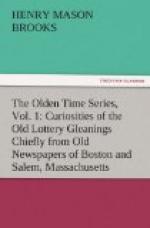[Footnote 1: Although we have seen lottery tickets signed by Hancock earlier in life.]
In some foreign countries and in a few of the States of our Union lotteries are still lawful; yet we believe there is a growing feeling against them. But if stock gambling is destined to take the place of the lottery, we do not think much will be gained by the change. The losses by lotteries were generally in small sums, and could be better borne by the adventurers than the entire loss of property, health, and reputation which is now too apt to follow a large proportion of the speculative stock operations. In the lottery, too, the risks were generally so small that the ticket-buyer alone suffered; whereas now, whole families are often involved in financial ruin, if not in disgrace, by the operations of a father, brother, or near relative. But we will say no more on this point, as it is a consideration foreign to the object of this book.
Thus far we have written mainly of American lotteries; as it is not our intention to take an exhaustive view of the subject, we will merely say, in reference to foreign countries, that lotteries were instituted in England in 1567, and abolished by Act of Parliament in 1823, although allowed until 1826, when the last drawing of a legal lottery took place. During this period they were patronized by all classes,—royalty, the nobility, gentry, and commoners. The first lottery was for the repairs of harbors and fortifications. The drawing took place at the “west door of St. Paul’s Church.” In 1612 King James I. granted a lottery for the “English Colonies in Virginia, ... to be held at the west end of St. Paul’s,” and “one Thomas Sharplys, a tailor, drew the chief Prize, which was 4000 crowns in fair plate.”
To this day the lottery flourishes in most of the chief cities in Europe, and lottery tickets are vended in many shops as well as in regular offices. The Cologne Cathedral, as is well known, was only recently finished by the aid of a lottery. Lotteries are upheld, we believe, by the Roman Catholic Church in Europe, and many of the priests aid in disposing of the tickets,—at least so we have been told.




